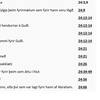Rannsókn á því hvort Nasareth hafi verið til þegar Jesús var uppi.
19.10.2009 | 12:52
Það sem ég flæki fyrir mér í þessu máli er að menn vilja slá því upp að Nasareth hafi ekki verð til þegar Jesús var uppi.
Eina sem sagt er um þetta er að Jesaja spámaður segir að Jesús skildi kallast Nasarei.
Nasírerar: Flokkur manna sem um lengri eða skemmri tíma hafði heitið því að helga líf sitt Guði. Þann tíma, máttu þeir ekki skera hár sitt eða neyta víns, þar eð vínið var tengt frjósemisdýrkun Kanverja. Allan tíma bindindisheit síns skyldu þeir halda sig frá öllu sem kallast óhreint. (4.Mós.6)
Matt 2:23
Þar settist hann að í borg, sem heitir Nasaret, en það átti að rætast, sem sagt var fyrir munn spámannanna: Nasarei skal hann kallast.
Síðan var fyrsta kraftaverk Jesú að breyta vatni í vín. En það er ekkert getið um hvort hann hafi smakkað það eða ekki.
Svo þarf að skoða síðustu kvöldmáltíðina. Var þetta vín sem þeir voru með í bikarnum eða kaleiknum? Þess er ekki getið í Lúkasarguðspjalli. Hins vegar segir annað í Matteusarguðspjalli. Þar er talað um vínviðar ávexti .
Matt 26:29
Ég segi yður: Héðan í frá mun ég eigi drekka af þessum vínviðar ávexti til þess dags, er ég drekk hann nýjan með yður í ríki föður míns.
Greynilegt er að Jesús smakkaði á víni, þannig að Jesaja getur þá ekki annað en að vera vitna í eitthvað meira en að Jesús yrði helgaður Guði ( Föðurnum)
Það sem er sagt um Nasareth er að þetta var lítill bær upp á hæðum í suður Galileu.Vestan við Nasareth var Mediterranean Sea og austan við Nasareth var Galileuvatn .Erfitt er að finna heimildir um nákvæman aldur þessar litla bæar sem þá var uppi en vitað er að rómverskur hershöfðingi sem var í stjórn yfir Galileu hafi lifað í Nasareth.
Josephus sem var sagnritari Gyðinga á tímum Jesús nefnir Nasareth ekkert á nafn í ritum sínum og er talið að þetta þótti ekki það merkilegur bær eða þorp að það þyrfti að nefna það nafni. Þá er stuðst við þessa tilvitnun:
Jóh 1:45-46
45.Filippus fann Natanael og sagði við hann: Vér höfum fundið þann, sem Móse skrifar um í lögmálinu og spámennirnir, Jesú frá Nasaret, son Jósefs. 46. Natanael sagði: Getur nokkuð gott komið frá Nasaret? Filippus svaraði: Kom þú og sjá.
Við sjáum í þessu svari að menn höfðu ekki mikla trúa á því að eitthvað gott gæti komið frá Nasareth, vegna þess að þar voru framdir hlutir sem voru svívirðilegir í augum gyðinga, þ.e.a.s hlutir sem þeir fyrirlitu.
Sumir vilja meina að Nasareth hafi heitið eitthvað annað fyrst. En svo þarf ekki að vera. Talið er að Jesús hafi verið kallaður Jesús frá Nasareth til að vera ekki ruglað við einhvern annan. En eftir að hafa lesið aðeins meira um þetta að þá var rétt nafn þorpsins Nazarene. Jafnvel íllu andarnir vitnuðu ertu komin til að tortíma okkur Jesús frá Nazarene? Og það eru fleyrri tilvitnanir. Íslensku þýðingarnar segja Nasareth en enskar vitna sumar sem Nazarene.
Ef það er skoðað frumtextan og aðrar enskar þýðingar að þá má sjá tilvitnanir þar sem er sagt Jesús frá Nazarene. Mark.1:24 , Lúk.18:37 , Mark.14:67 , Jóh.18:5-7 , Jóh.19:19 , Lúk.24:19 , Mark.16:16 , Post.2:22 , Post.3.6 , Post.4:10 , Post.26:9 , Post. 6:14 , Post.24:5 , Matt.2:23 , Jesaja.11:1 , Jóh.1:46 ,
Hér að neðan kemur svo greinin um þessi vers á ensku.
NAZARENE A Nazarene was a native or inhabitant of Nazareth, a New Testament town in lower Galilee. Nazareth was Jesus’ hometown during the first thirty years of his life. Since the name Jesus was a common name among the Jews, and since last names were not used, perhaps the designation Nazarene differentiated Jesus of Nazareth from others with the same name. The designation Jesus the Nazarene was used by demons (Mark 1:24), the crowd outside Jericho (Luke 18:37), a servant girl (Mark 14:67), soldiers (John 18:5-7), Pilate (John 19:19), the two disciples on the road to Emmaus (Luke 24:19), and the angel at the tomb (Mark 16:6). The apostles in Acts also used the designation to identify Jesus. Peter speaks of Jesus the Nazarene in his sermon on the day of Pentecost (Acts 2:22) and at the temple gate in a subsequent healing (Acts 3:6; Acts 4:10). Paul identifies Jesus as such in Acts 26:9. One hostile reference to the name is found in Acts 6:14. The false witnesses against Stephen accused him before the Sanhedrin of saying, “This Nazarene, Jesus, will destroy this place [temple] and alter the customs that Moses handed down to us” (see the Greek). Another antagonistic reference is found in Acts 24:5 and constitutes the only reference to Jesus’ followers as Nazarenes. Tertullus accused Paul, saying, “For we have found him to be a troublemaker, a man who is constantly inciting the Jews throughout the world to riots and rebellions against the Roman government. He is a ringleader of the sect known as the Nazarenes.” With regard to the name Nazarene, Matthew 2:23 has always been problematic: “So they went and lived in a town called Nazareth. This fulfilled what was spoken by the prophets concerning the Messiah: ‘He will be called a Nazarene.’ “ No Old Testament prophecy directly states that the Messiah would be called a Nazarene. Some scholars relate Matthew’s reference to Isaiah 11:1, which speaks of the Messiah as a “Branch”-a Hebrew term derived from the same root as Nazareth. Others point to the Old Testament prophecies that speak about the despising and reviling of the Messiah. They say this was like saying he was a Nazarene, even though it was well known that the Messiah was supposed to come from Bethlehem, the city of David. Of course, Bethlehem is where Jesus was born. But he was raised in Nazareth and subsequently was known as a Nazarene and was ridiculed as such. Thus, the prophecy was fulfilled when some of his contemporaries called him a Nazarene, from the despised town of Nazareth (John 1:46).
Síðan aðeins neðar koma heimildir af http://wikipedia.org á ensku líka
Nazarene (title)
From Wikipedia, the free encyclopedia
Mary's Well, said to be the site of the Annunciation, Nazareth, 1917
For other uses, see Nazarene (disambiguation).
Look up Nazarene in Wiktionary, the free dictionary.
Nazarene is a title applied to Jesus (c. 2 BC- c. AD 30) who, according to the Christian gospels, grew up in Nazareth, a settlement in Lower Galilee, now in northern Israel. In modern translations, the word "Nazareth" not only refers to this settlement,[1] but also translates two related words that appear in the Greek New Testament: Nazarēne (Nazarene) and Nazōraios (Nazorean). Thus, the Greek phrases traditionally rendered as "Jesus of Nazareth" are often more literally translated "Jesus the Nazarene" or "Jesus the Nazorean."[2] Therefore, it is possible that the title "Nazarene/Nazorean" had a religious significance. Both Nazarene and Nazorean are novel in Greek and the additional vowel in "Nazorean" complicates any derivation from Nazareth.[3]
The Greek New Testament uses "Nazarene" six times, while "Nazorean" is used 13 times. In the Book of Acts, Nazorean is used to refer to a follower of Jesus, i.e. a Christian, rather than an inhabitant of a town.[4] The Gospel of Matthew explains that the title "Nazorean" is derived from the prophecy, "He will be called a Nazorean."[5] Scholars have long puzzled over the fact that no such prophecy is known in Jewish scripture.[6] Some suppose that it refers to a passage in the Book of Isaiah,[7] with "Nazorean" a Greek reading of the Hebrew ne•tser (branch), understood as a messianic title.[8] Others point to a passage in the Book of Judges which refers to Samson as a Nazirite.[9] "Nazarene" is the modern Hebrew word for Christian (No•tsri, נוֹצְרִי) and one of two words commonly used to mean "Christian" in Arabic (Naṣrānī, نصراني).
Contents
[hide]
• 1 Etymology
o 1.1 "He will be called a Nazorean"
o 1.2 Derivation from "Nazareth" challenged
• 2 A town that never was?
• 3 Table of variants
o 3.1 Nazarene (3479)
o 3.2 Nazorean (3480)
o 3.3 Nazareth (3478)
• 4 References
[edit]Etymology
Nazarene is anglicized from Greek Nazarēne (Ναζαρηνέ), a word used to refer to Jesus in the New Testament.[10] The traditional view is that this word is derived from the Hebrew word for Nazareth,[11] though this derivation presents etymological difficulties (see below). The Semitic form of "Nazareth" (nun-tsade-resh-tav) in turn could be derived from either na•tsar, נָצַר, meaning "to watch,"[12] or from ne•tser, נֵ֫צֶר, meaning branch.[13]
Jerome (c. 347 – 420) linked "Nazarene" to a messianic prophecy by Isaiah, claiming that "Nazarene" was the Hebrew reading of a word modern scholars read as ne•tzer (branch).[14] The text from Isaiah is:
“ There shall come forth a Rod from the stem of Jesse, And a Branch shall grow out of his roots.
ve•ya•tza cho•ter mig•ge•za yi•shai ve•ne•tzer mi•sha•ra•shav yif•reh.[7]
”
In ancient Hebrew texts, vowels were not indicated, so a wider variety of readings was possible in Jerome's time. Here branch/Nazarene is metaphorically "descendant" (of Jesse, father of King David). Eusebius, a fourth century Christian polemicist, also argued that Isaiah was the source of "Nazarene." This prophecy by Isaiah was extremely popular in New Testament times and is also referred to in Romans and Revelation.[15]
[edit]"He will be called a Nazorean"
A link between Nazorean and Nazareth is found in Matthew:
“ And after being warned in a dream, he went away to the district of Galilee. There he made his home in a town called Nazareth, so that what had been spoken through the prophets might be fulfilled, “He will be called a Nazorean.”
chrēmatistheis de kat onar anechōrēsen eis ta merē tēs galilaias kai elthōn katōkēsen eis polin legomenēn nazaret opōs plērōthē to rēthen dia tōn prophētōn oti nazōraios.[5]
”
The passage presents difficulties: (1) no prophecy is known in Jewish scripture, "He shall be called a Nazorean; (2) "Nazorean" is a new term, appearing here for the first time in association with Nazareth and, indeed, for the first time anywhere; and (3) scholars surmise that the settlement of Nazareth would have been very small in Jesus' time,[16] while a few doubt that it even existed yet.[17] In any case, Matthew's characterization of the settlement as already a "city" (polin) is problematic.
The Hebrew words most often suggested as underlying the Greek cognates Nazarene-Nazorean-Nazareth are:
 na•tsar (נָצַר, n-ts-r), pronounced naw•tsar', meaning "to watch, guard, keep".[18]
 ne•tser (נֵ֫צֶר, n-ts-r), pronounced nay'•tser, meaning "branch", "flower", or "offshoot". Derived from na•tsar (above).[19]
 na•zir (נָזִיר, n-z-r), pronounced naw•zeer', meaning "one consecrated, devoted".[20]
Only Isaiah's prophecy spells "branch" as ne•tser, but there are four other messianic prophecies where the word for branch is tze•mach.[21] Matthew's phrase "spoken through the prophets" may suggest that these passages are being referred to collectively.[8] In contrast, the phrase "through the prophet," used a few verses above the Nazorean prophecy,[22] refers to a specific Old Testament passage.[23]
The Nazirite (n-z-r) was a person consecrated to God either from birth (Samson, Samuel) or for a limited time.[24] A passage in the Book of Judges which refers to Samson as a Nazirite has been suggested as a source for Matthew's prophecy because "Nazorite" is only one letter off from "Nazorean" in Greek.[9]France, R. T., The Gospel of Matthew, pp. 92-93. See Judges 13:5-7. The Septuagint gives "Nazirite" as ναζιραιον, while Matthew gives Nazorean as Ναζωραῖος. But the characterization of Jesus in the New Testament is not of a typical Nazirite, and it is questionable whether Matthew intended a comparison between Jesus and the amoral Samson.[9]
[edit]Derivation from "Nazareth" challenged
The issue of whether Nazarene is derived from Nazareth has been the subject of much scholarly conjecture since the 19th century.[25] The Greek phrase usually translated as "Jesus of Nazareth" (iēsous o nazōraios) can be translated more literally as "Jesus the Nazorean."[26] No one else is referred to in scripture in this way, not even other people from Nazareth. For example, the father of Jesus is iōsēph ton apo nazaret (Joseph of Nazareth).[27]
"Nazareth" and "Nazarene" are complementary only in Greek, for in Greek both terms possess the "z" (a voiced [aspirated] sibilant). In Semitic languages, "Nazarene" and its cognates (Nazareth, Nazara, Nazorean) possess the unvoiced (unaspirated) sibilant, that is, the "s" or "ts" sound. Voiced and unvoiced sounds follow separate linguistic pathways. The Greek forms referring to Nazareth should therefore be Nasarene,Nasoraios, and Nasareth. The additional vowel (ω) in Nazorean makes this variation more difficult to derive, although a weak Aramaic vowel in "Nazareth" has been suggested as a possible source.[3]
The Gospel of Philip, a second century Gnostic work, claims that the word "Nazarene" signifies "the truth":
“ "Jesus" is a hidden name, "Christ" is a revealed name. For this reason "Jesus" is not particular to any language; rather he is always called by the name "Jesus". While as for "Christ", in Syriac it is "Messiah", in Greek it is "Christ". Certainly all the others have it according to their own language. "The Nazarene" is he who reveals what is hidden. Christ has everything in himself, whether man, or angel, or mystery, and the Father....[28]
The apostles who were before us had these names for him: "Jesus, the Nazorean, Messiah", that is, "Jesus, the Nazorean, the Christ". The last name is "Christ", the first is "Jesus", that in the middle is "the Nazarene". "Messiah" has two meanings, both "the Christ" and "the measured". "Jesus" in Hebrew is "the redemption". "Nazara" is "the Truth". "The Nazarene" then, is "the Truth". "Christ" [unreadable] has been measured. "The Nazarene" and "Jesus" are they who have been measured.[29]
”
"Gnostic" is Greek for "knowledge", as the Gnostics claimed to have hidden knowledge concerning the religions of others.
Another possible source of Nazarene is Natsarenes, priests of the Mandeans (said to be followers of John the Baptist). Epiphanius writes of a "pre-Christian" Jewish sect which he calls Nasarenes.[30] This sect has been variously identified with the Mandeans, Samaritans, or Rechabites.[31] The Jewish Christian Nazarenes may have evolved into the Ebionites. In Acts, Paul of Tarsus is called, "a ringleader of the sect of the Nazoreans,"[4] thus identifying Nazorean with Christian.
The Gospel of Mark, considered the oldest gospel, consistently uses "Nazarene," while scripture written later generally uses "Nazorean." This suggests that the form more closely tied to "Nazareth" came first. Another possibility is that Mark used this form because the more explicitly messianic form was still controversial when he was writing. Before he was baptized, Mark refers to Jesus as "from Nazareth of Galilee,"[32]whereas afterwards he is "the Nazarene,"[33] suggesting a transformation at the time of baptism. In a similar fashion, second century messianic claimant Simon bar Kokhba (Aramaic for "Simon, son of a star"), changed his name from Simon bar Kosiba to add a reference to the Star Prophecy.[34]
[edit]A town that never was?
Although the historian Flavius Josephus (AD 37 – c. 100) mentions 45 towns in Galilee, he never mentions Nazareth. But Josephus also writes that Galilee had 219 villages in all,[35] so it is clear that most village names have gone unrecorded in surviving literature. Nazareth was overshadowed by nearby Japhia in his time, so Josephus might not have thought of it as a separate town.[36] The earliest known reference to Nazareth outside the New Testament and as a contemporary town is by Julius Africanus, who wrote around AD 200.[37] Writers who question the association of Nazareth with the life of Jesus suggest that "Nazorean" was originally a religious title and was later reinterpreted as referring to a town.[38] This process would assign Nazareth as a hometown. At one point, Mark states the home of Jesus was in Capernaum, possibly the remnant of an older tradition that is otherwise lost.[39]
[edit]Table of variants
The numbers in parenthesis are from Strong's Concordance.
[edit]Nazarene (3479)
 Nazarēne (Ναζαρηνέ) Mark 1:24, Luke 4:34
 Nazarēnon (Ναζαρηνὸν) Mark 16:6
 Nazarēnos (Ναζαρηνός) Mark 10:47
 Nazarēnou (Ναζαρηνοῦ) Mark 14:67, Luke 24:19
[edit]Nazorean (3480)
 Nazōraios (Ναζωραῖος) Matthew 2:23, Luke 18:37, John 19:19 Acts 6:14, Acts 22:8
 Nazōraiou (Ναζωραίου) Matthew 26:71, Acts 3:6, Acts 4:10, Acts 26:9
 Nazōraiōn (Ναζωραίων) Acts 24:5
 Nazōraion (Ναζωραῖον) John 18:5, John 18:7, Acts 2:22
[edit]Nazareth (3478)
 Nazareth (Ναζαρέθ) Matthew 21:11, Luke 1:26, Luke 2:4, Luke 2:39, Luke 2:51, Acts 10:38
 Nazara (Ναζαρα) Matthew 4:13, Luke 4:16
 Nazaret (Ναζαρὲτ) Mark 1:9, Matthew 2:23, John 1:45, John 1:46
[edit]References
1. ^ See Mark 1:9, Matthew 2:23, etc.
2. ^ Fifteen times in the New International Version. See Luke 18:37.
3. ^ a b Bromiley, Geoffrey W., The International Standard Bible Encyclopedia: K-P, pp. 499-500.
4. ^ a b Acts 24:5
5. ^ a b Matthew 2:22-23, New Revised Standard Version.
6. ^ J. Eisenman, James the Brother of Jesus (Penguin, 1997) p. 243; R. Price, Deconstructing Jesus (Prometheus,2000) p. 258
7. ^ a b Isaiah 11:1
8. ^ a b Miller, Fred P., Isaiah's Use of the word "Branch" or Nazarene"
9. ^ a b c France, R. T., The Gospel of Matthew, pp. 92-93. See Judges 13:5-7. The Septuagint gives "Nazirite" as ναζιραιον, while Matthew gives Nazorean as Ναζωραῖος.
10. ^ See Mark 1:24 and Luke 4:34
11. ^ "The name has obvious reference to Nazareth," ("Nazarene", The Catholic Encyclopedia, 1911.)
Schaeder, H., "Nazarenos, Nazoraios" in G. Kittel, "Theological Dict. of the New Testament," p. 874.
Albright, W., "Nazareth and Nazoraean," J. of Biblical Lit. 65:2 (June 1946), pp.397–401.
12. ^ The Brown-Driver-Briggs Hebrew and English Lexicon (1906/2003), p. 665.
"Some, however, think that the name of the city must be connected with the name of the hill behind it, from which one of the finest prospects in Palestine is obtained, and accordingly they derive it from the Hebrew notserah, i.e., one guarding or watching." (Easton's Bible Dictionary, (1897)).
"...if the word Nazareth is be derived from Hebrew at all, it must come from this root [i.e. נֹצְרִ, nostri, to watch]" (Merrill, Selah, (1881) Galilee in the Time of Christ, p. 116.
13. ^ "The etymology of Nazara is neser" ("Nazareth", The Catholic Encyclopedia, 1911.)
"NAZARETH, NAZARENE - Place name meaning, 'branch.'" (Holman's Bible Dictionary, 1994.)
"Generally supposed to be the Greek form of the Hebrew netser, a "shoot" or "sprout." (Easton's Bible Dictionary, (1897)).
14. ^ "For in the place where we read and translate, There shall come forth a rod out of the stem of Jesse, and a branch shall grow out of his roots, in the Hebrew idiom it is written thus, There shall come forth a rod out of the root of Jesse and a Nazarene shall grow from his root." (Jerome, Letter 47:7).
15. ^ Bauckham, Richard, Jude and the Relatives of Jesus in the Early Church, p. 65. See Romans 15:12 and Revelation 5:5.
16. ^ J. Strange, "Nazareth" in the Anchor Bible Dictionary. New York: Doubleday, 1992; E. Meyers & J. Strange, Archaeology, the Rabbis, & Early Christianity Nashville: Abingdon, 1981, p. 57.
17. ^ Zindler, F. "Where Jesus Never Walked", American Atheist, Winter 1996-97, pp. 33-42.[1]. Salm, R. The Myth of Nazareth: The Invented Town of Jesus, American Atheist Press (2008).
18. ^ Strong number 5341. From Jeremiah 31:5-6
19. ^ Strong number 5342. Brown, Michael L., Answering Jewish Objections to Jesus, Volume 4, Baker Books, 2006.
From Isaiah 11:1
20. ^ Strong number 5139. Messianic implication based on Genesis 49:26 and Deuteronomy 33:16.
21. ^ Jeremiah 23:5-6, Jeremiah 33:15-16, Zechariah 3:8, and Zechariah 6:12.
22. ^ Matthew 2:15
23. ^ Namely Hosea 11:1
24. ^ Num 6:2ff.; Mischna tractate Nazir.
25. ^ Kittel, G, "Nazarenos, Nazoraios", Theological Dictionary of the New Testament, pp. 875 ff.
26. ^ "Although modern NT translations repeated references to 'Jesus of Nazareth', 'Jesus the Nazarene' is the more common form of words in the original Greek version." (Wilson, Ian, (1984) Jesus: The Evidence, p. 67.) See, for example, Luke 18:37.
27. ^ John 1:45 Jesus is also referred to in this style in Acts 10:38.
28. ^ The Gospel of Philip, Translated by Wesley W. Isenberg, 56.
29. ^ The Gospel of Philip, Translated by Wesley W. Isenberg, 62.
30. ^ Panarion 18.
31. ^ Pritz, R., "Nazarene Jewish Christianity" (Brill 1988) p. 47.
32. ^ Mark 1:9
33. ^ Mark 1:24
34. ^ Bauckham, Jude, Relatives of Jesus in the Early Church, p. 64. The prophecy may be found at Numbers 24:17
35. ^ Josephus, Vita, 45.
36. ^ "Nazareth", Jewish Encyclopedia, 1901-1906.
37. ^ Eusebius, Church History 1.7.14.
38. ^ Loisy, Alfred; L. P. Jacks. The Birth of the Christian Religion. London: George Allen & Unwin. p. 413. OCLC 2037483. Retrieved 2007-12-24.
39. ^ Mark 2:1









Bæta við athugasemd [Innskráning]
Ekki er lengur hægt að skrifa athugasemdir við færsluna, þar sem tímamörk á athugasemdir eru liðin.